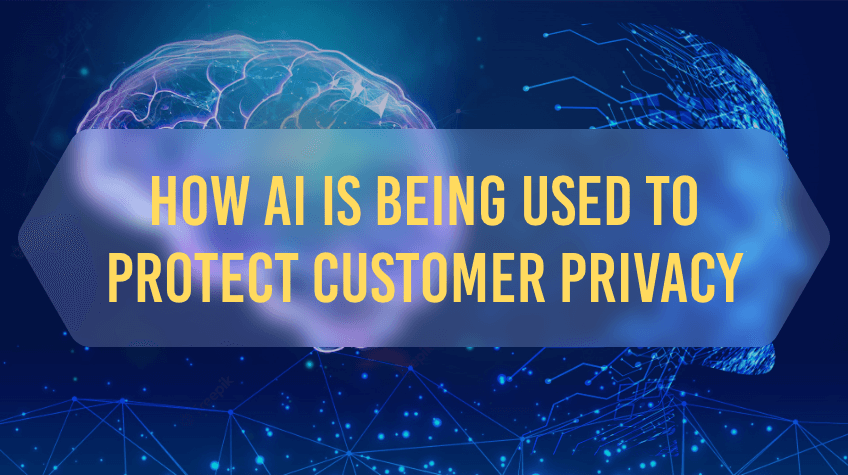
Artificial intelligence (AI) is being employed in many of the apps that drive the digital workplace.
AI has penetrated the technologies in place to protect the privacy of customers and app users, as well as the organization itself.
AI allows computers to perform human capabilities like thinking and perception more efficiently. Natural language processing, speech recognition, and computer vision are examples of AI applications. This article discusses various ways by which AI protects the customers’ privacy
7 Ways AI Protects Customer Privacy
1. Protection From Data Breaches and Malware
Customer data can be protected with AI because it detects and responds to data breaches. AI technology uses a more efficient system than traditional security measures. This is because of its automated features. AI protects data by detecting malware via behavior modeling and employing automated countermeasures.
AI has no such constraints as humans do in terms of time. They can monitor and flag any faults they find, because of its ability to continuously monitor network behavior. AI models can identify any irregularities that it sees on a 24/7 basis. AI is really proven to be a valuable asset in securing client data.
2. Standardize Privacy Practices and Improve Compliances
Enterprises can reap the benefits of AI by expediting data privacy initiatives with AI algorithms. This will help identify sensitive data throughout a data ecosystem in both batch and/or real-time processing.
The right to be forgotten by a consumer is an example of how artificial intelligence (AI) could be used to assure compliance. AI might also be used to search across a corporate data ecosystem. This is done for specific individuals who have previously requested to be forgotten.
In this scenario, a business may ensure that a certain group of people is genuinely removed across their whole data ecosystem–even down to the level of a PDF contract agreement. AI can also assist in the standardization of these privacy measures.
Related Blog: Protecting Your Privacy in iOS App
3. Identify Anomalous Behaviors
Machine learning (ML) can be used to discover anomalies. Anomaly detection is the process of discovering data points that do not fit the expected patterns. It may be used to tackle a variety of issues, such as fraud detection and medical diagnosis. Anomaly detection can be automated and made more successful using ML approaches. This is especially true when huge datasets are involved.
Access to critical data can be better monitored with AI. This would entail training models to recognize and flag abnormal behavior. Model operationalization (ModelOps) can also be used to manage the life cycle of these models.
ModelOps is a collection of capabilities that focuses on governance. It also focuses on the full life cycle management of all AI and ML models. ML models, optimization, and natural language approaches are all examples of ModelOps. The categories of data accessed and the behavior of the group the user belongs to, determine whether a user’s behavior warrants an alert. For issuing alarms on these anomalies without generating a lot of false positives, an AI or ML model is effective.
4. Gather Decentralized Data For Better Privacy
Federated learning is another area where AI helps enhance client privacy. This allows data scientists to construct models on data from numerous sources.
Customer data privacy does not have to be compromised as AI technology advances, thanks to the usage of federated learning. For example, two banks could be interested in developing an algorithm for detecting bad loans early without exposing clients’ personal information. Federated learning assists in securely achieving this goal.
5. Streamline Interactions
AI could also automate and streamline interactions with users regarding privacy requests. Privacy requests such as the right to know what personal information an organization has on them, and the right to be forgotten.
By simply comprehending the voice and context of the request, AI-enabled Natural Language Interfaces (NLI) make interactions with a customer simple. This can speed up multiple individual steps within a process.
As the general public places a larger value on their privacy, the amount of these demands will only increase. In these situations, AI might be integrated into a front-end conversational interface that is linked to various data inventorying capabilities on the back end.
6. Helps With Enhancing Knowledge on Security
Customers need to have some knowledge about the security of their data. By enhancing knowledge, AI could also assist consumers in better understanding what various data protection policies mean in practice.
AI data privacy solutions are also being used by businesses to detect data breaches, and warn and educate customers on security. Google Chrome, for example, now includes password breach notifications. These apps scour the dark web for hijacked credentials and alert users if their personal information has been compromised on a website they have visited.
Also, AI can help enhance students’ knowledge about security. When AI is combined with high-quality learning materials and training, it can help students learn security better and quicker. This can then help them secure student jobs that fit in their schedule.
7. Automate Threat Detection
Every day, analysts at the security operations center are inundated with security warnings, and many of which are false. They end up wasting too much time performing mundane work and not enough time working on important issues. They also usually miss advanced attacks.
Today companies deploy artificial intelligence and machine learning only to deal with the volume and sophistication of attacks. Also, AI and ML can be used to automate repetitive processes, such as responding to the enormous volumes of low-risk warnings.
For example, if a known sample of ransomware appears on a user’s device, turning down the device’s network connectivity immediately can prevent the rest of the firm from becoming infected. AI can be used to automate the detection of ransomware and take actions to mitigate it.
Conclusion
AI-driven data security and privacy tools can substantially assist firms in ensuring better privacy for their sensitive data. Natural language processing (NLP) can help compliance managers decrease administrative burdens. AI technology can also be used to automate threat detection and identify anomalies.
AI systems are also useful for monitoring and protecting all types of personal data. It also ensures that the organization’s security measures conform to all industry privacy requirements and legislation. As for assuring high-end data protection and privacy, AI is emerging as a powerful technology ally for all types of businesses.






